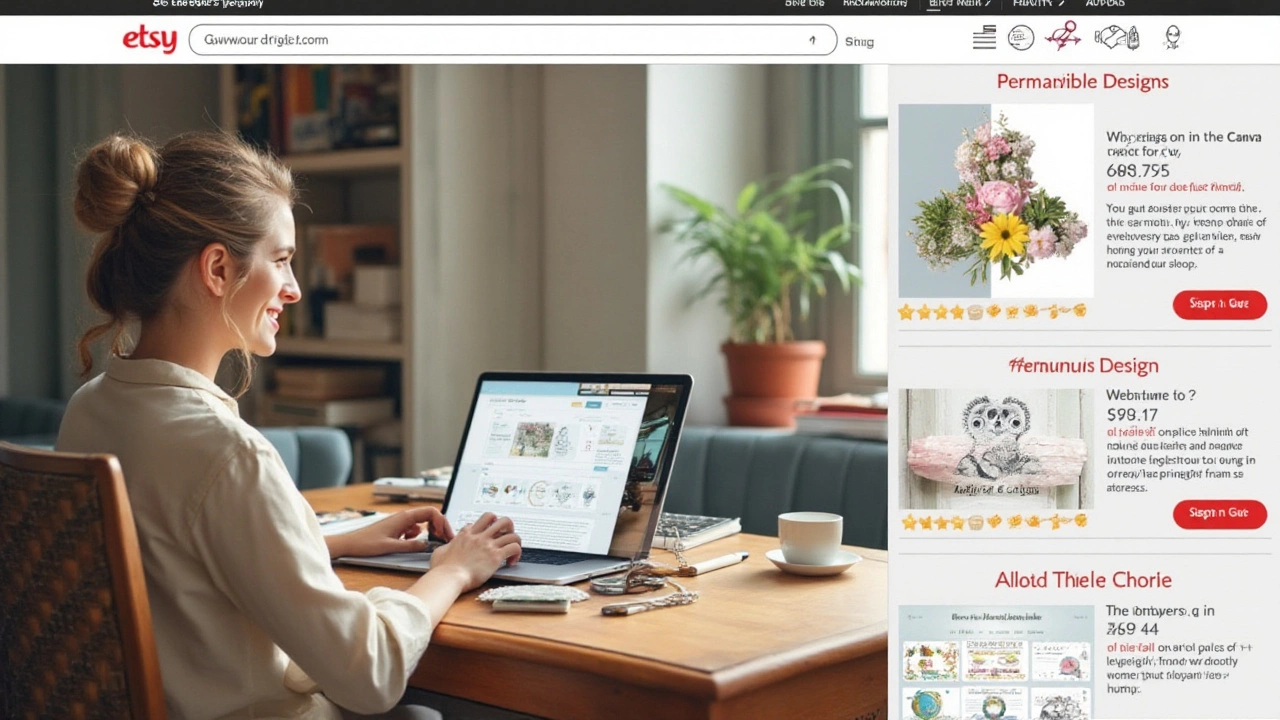Setting up shop on Etsy to sell digital designs is an exciting opportunity for creative minds. Yet, when it comes to using Canva templates, many sellers wonder about the legalities involved. As a seller, it's crucial to be aware of what can and cannot be done under Canva's terms to avoid any infringement issues. This article delves into the essential guidelines for legally selling Canva templates on Etsy, offering useful insights for digital artists.
In this read, we unravel the terms of Canva's use, analyze the available licensing options, and what those mean if you plan on selling your designs. Discover how your creativity can thrive within legal boundaries, ensuring your digital products are both innovative and compliant as you start your journey on Etsy's bustling platform.
- Understanding Canva's Terms of Use
- Licensing Options and Implications
- Design Originality and Legal Considerations
- Types of Canva Templates That Can Be Sold
- Protecting Your Work on Etsy
- Tips for Ethical and Successful Selling
Understanding Canva's Terms of Use
When setting up shop to sell Canva templates on Etsy, the first and most crucial step is understanding Canva's specific Terms of Use. These terms lay the groundwork for what you can and cannot do with the designs you create using the platform. It's not just about skimming the surface; a thorough understanding can save you from legal troubles down the road. Canva provides a variety of features and design elements, but not all of them come with the same usage rights. Whether you are creating for personal use or planning to sell, respecting these stipulations is vital. Diving into the finer details, Canva's Free Media License Agreement allows for varied applications where users can indeed utilize elements in their templates, provided they adhere to the 'no resell' rule in a direct or equivalent manner. This ensures that individual elements cannot simply be sold as they are, protecting the original creators.
Under their Free and Pro plans, Canva distinguishes between the use of free media and paid content to help users navigate potential uses. While free elements are more flexible, Pro content requires a one-time license purchase if you intend to redistribute a design for commercial purposes. This is especially relevant when customizing and selling digital art like templates on platforms like Etsy. Canva's fair usage policies stipulate the importance of creating something original and distinct. To ensure compliance, it's essential to use these elements to create a product that offers added value and creativity, rather than just repackaging what's already there. Remember, compliance isn’t just a legal issue; it’s about respect and ethical practice in the digital space.
A fascinating facet of Canva’s user terms is how they stress the value of design transformation. The platform encourages creativity but clearly states that simply taking a Canva element and inserting it into another template with little alteration doesn’t meet their guidelines. Instead, users are expected to modify and personalize Canva-provided materials significantly. This can involve altering colors, adding unique features, or integrating these elements into a broader composition that you can truly call your own.
For those unaware, the ‘Canva for Education’ and ‘Canva for Nonprofits’ often offer additional resources, underlining even newer impositions on usage, meshed with altruistic undertones. According to Canva's own guidelines, users beneficiaries under these plans often have slightly varied conditions channeled to goodwill.
Canva states, "Our content licenses explain what you can do with the stock media you buy, in simpler terms." (Canva Legal)
Reflecting on Canva’s mission to democratize design, their terms also lay out the importance of non-infringement, meaning that your use of their platform should never intentionally exploit the rights of others. This includes respecting copyrighted materials beyond Canva’s own library, requiring vigilance if you are integrating external content from different sources. Whether these come from other stock libraries or user-generated input, ensuring attribution and usage rights is a critical component of ethical design on Canva.
Licensing Options and Implications
When venturing into the world of selling Canva templates on Etsy, it's important to grasp the implications of Canva's licensing options. Canva offers two primary licensing models: the Free Media License and the Pro Media License. Each comes with its set of stipulations, and understanding these is key to ensuring that your creative endeavors remain legally sound. The Free Media License covers content made available to all users, allowing for personal and commercial use but often with limitations on redistribution or resale as stand-alone products.
On the other hand, the Pro Media License offers more flexibility, yet it is available only to Canva Pro subscribers. This license typically allows for a broader scope of usage, including the creation of derivative designs for sale, provided they adhere to Canva's terms. When working with Canva's elements, you must integrate the media into a new, unique design - reselling unaltered content straight from Canva is not permitted. The distinction here lies in creating something transformative, where your personal input has redefined and enriched the original template significantly.
"The essence of creative work is turning the old into the new, reinventing what has been done into something uniquely yours," remarks a digital marketing expert.Employing these licenses conscientiously is vital. Failing to do so can result in legal ramifications, including the removal of listings from Etsy or potential bans. Respecting these guidelines also means respecting the hard work of fellow designers whose elements you might incorporate into your designs.
For those wondering about selling Canva templates on Etsy, these licensing details can't be overlooked. Canva stipulates that designs must involve creativity beyond the mere use of existing templates. Your contributions should reflect substantial additional content or artistry. Understanding how your work transforms the template can help you stay within legal boundaries and safeguard your artistic integrity.
To make things simpler, Canva encourages sellers to refer to their support page, which outlines the intricacies of acceptable use under both the Free and Pro licenses. Integrating your own originality into Canva's platform not only respects their effort but enhances your own brand’s identity as well. It's a symbiotic relationship where both Canva and the designer benefit from mutual respect for creative boundaries.
However, as the digital landscape is continuously evolving, it's wise to stay updated with Canva's terms and periodically review the agreements as the company may alter licensing terms to better suit new creative opportunities or digital norms. Keeping informed helps you continuously align your digital offerings with the current licensing frameworks and guarantees you have peace of mind while selling on Etsy. In fact, regularly reading direct sources such as Canva's official announcements or blogs can be an effective measure to ensure compliance and creativity align perfectly.
This framework not only enables the creation of legal, ethical, and profitable work but also fosters innovation within creative communities. And perhaps one day, your own innovative template might inspire another designer to take a fresh look at what is possible with Canva templates.

Design Originality and Legal Considerations
When it comes to selling Canva templates on Etsy, the aspect of design originality is at the heart of staying compliant with both Canva's rules and broader copyright laws. As a creative enthusiast, ensuring that your work reflects a unique take or twist prevents it from being seen as a mere copy of something that already exists. This uniqueness isn't just a legal requirement, but also a selling point, as customers are often on the lookout for fresh, original digital art that resonates with them personally.
One might wonder, what exactly dictates originality in the world of templates and digital design? While Canva offers a plethora of tools and resources, from fonts to images, to build from, the onus is on the individual artist to craft a new creation. This means combining elements in innovative ways or altering existing structures to form a composition that doesn't look derivative of another artist's work. Canva insists on this; its licensing terms clarify that while using their elements is permissible, a user cannot sell unaltered works. It’s all about that creative spark, and how you light it up uniquely.
Legal considerations surrounding originality are not just centered on adhering to Canva's guidelines but also include broader copyright laws. Consider that each element, whether it's an illustration or a piece of text, may have its own rights attached. The principle of copyright seeks to protect the creator's rights and interests. As you assemble your design, recognizing these rights and ensuring full compliance reflects both respect for other creators' work and diligence towards your business integrity. Businesses that overlook this can face repercussions, ranging from product removal to more severe legal action, making this a risk not worth taking.
Statistics show that online marketplaces, including Etsy, often deal with a surge in copyright infringement cases. A proactive approach to understanding and following the rules not only protects you but also strengthens your brand's credibility. Reports indicate that designers who prioritize originality have better traction in the market as they foster trust with their audience. This trust translates into repeat customers who value their commitment to creativity and ethical standards. Quoting a renowned copyright expert, "Innovation without imitation is not only the law but the lifeline of creative art found online."
In this digital age, being informed and proactive is your shield and sword. Equipping yourself with knowledge about design laws and rights allows you to navigate this vibrant marketplace effectively. Make use of legal guidelines as your framework, and fill it out with your creative spirit to produce work that truly shines. You stand not only to follow the right path but create a pathway others admire and trust.
Types of Canva Templates That Can Be Sold
Diving into the world of selling Canva templates on Etsy requires a clear understanding of what's permissible. Canva's terms of use are quite specific about this, allowing users to sell original designs as long as they comply with certain guidelines. Selling templates created using Canva's free elements is generally acceptable, provided that these elements are combined and transformed with enough creativity and originality. It's the unique design that showcases your personal touch and ensures you're not simply redistributing Canva's resources as your own.
To start, it's essential to recognize which Canva templates are permissible. Designs must contain a blend of your own artistry and ingenuity, integrating free fonts, images, or illustrated elements within Canva. The crux lies in creativity—using free icons, graphics, or backgrounds in a transformative and distinctive manner. Remember, the key to successfully selling these designs lies in ensuring the overall composition is yours. As a creative, don't just rely on helpful templates; infuse your work with unexpected variations, adjustments, and original elements to spark that distinctive charm.
Original Creations and Limiting Reusable Designs
Canva also offers a range of licensed content, some of which is not intended for commercial distribution. Hence, understanding and avoiding the use of Canva's pro elements—unless you own a proper license—is vital. While the platform's paid features offer exciting resources, their use does necessitate careful scrutiny. A conservative approach would be to focus on crafting entirely original content using Canva's basic, free tools. With free reign over these elements, you'll develop templates that not only harmonize with legal guidelines but also highlight your distinctive flair.
Quote: "Using Canva to spark creativity while keeping its terms in mind ensures a seamless blend of innovation and compliance." — Creative Commons Expert
Creativity should also expand beyond Canva's predefined boundaries. By investing time in learning new techniques and experimenting, you can produce templates that hold buyer appeal without infringing on Canva's terms. Consider experimenting with niche-specific designs—a route not often taken by many commercial artists. This originality sets you apart, giving your store a unique edge on Etsy's competitive platform.
Consideration for Style Consistency
Another aspect to consider when creating Etsy selling products is stylistic consistency. Buyers are often drawn to sellers that offer a cohesive collection. Imagine designing a series of templates for wedding invitations: they should share a style that people recognize as yours. Such collections not only create a brand image but also invite repeat purchases from satisfied customers. This strategic design approach encourages artists to think beyond one-off designs and explore themed templates.
Indeed, this approach can be advantageous for artists, as collections cultivate brand identity and draw specific clientele. Cohesion in style offers buyers a more visually satisfying experience, giving them a reason to explore further within your shop. As such, diving into Canva's creative pot—with this strategy in mind—could open new avenues in your digital art-selling journey. It can transform your hobby into a thriving business, one template at a time.

Protecting Your Work on Etsy
When you're crafting and selling works on Etsy, there's always the consideration of protecting your creativity and ensuring that your hard work isn't misused or stolen. Understanding the nuances of intellectual property and leveraging Etsy's built-in protections can make a big difference in maintaining control over your creations. One of the first steps to protecting your work is familiarizing yourself with the concept of copyright. In essence, copyright grants you the rights to your creations automatically once they're made. This can give you some legal standing if disputes about your work arise. However, remember that copyright law can vary significantly across countries, so it's worth exploring what applies specifically to you.
In addition, Etsy offers several tools and features that allow sellers to protect their businesses. For instance, making use of Etsy's Verified Rights Owner (VeRO) program can be indispensable. This program allows rights owners to report infringing items, ensuring that they are removed from the site. Alongside such measures, you might consider watermarking your digital products. While watermarks may not entirely prevent unauthorized use, they do discourage it, as buyers are less likely to purchase designs with obtrusive logos or marks. It's a simple yet effective way to safeguard your efforts.
Apart from these protections, it's worth exploring what a trademark can offer. If your brand includes a unique name, slogan, or logo, obtaining a trademark can provide you with exclusive rights to those elements. This means no one else can legally use these aspects of your brand without permission, giving you added security. Additionally, according to the U.S. Patent and Trademark Office, "A trademark is a brand identifier that makes it distinguishable from others," helping protect your brand's integrity in the marketplace.
Another critical aspect of safeguarding your Canva templates involves clear communication with your buyers. Drafting comprehensive licenses and terms of use that outline how your work can be used will help clarify the rights buyers have. Not only does this set boundaries, but it also helps prevent misunderstandings. And though it might feel a bit daunting, setting these expectations openly creates a more respectful relationship between seller and buyer. Effective communication acts as a buffer, minimizing potential legal entanglements that could arise from misinterpretation or misuse of your templates.
Moreover, don't forget to consistently monitor your shop and stay engaged with your community. Regularly updating your listings to reflect any changes in your terms of use or the evolving features of your designs helps keep your store frontrunner in compliance and user friendliness. Engaging actively with your audience also builds a genuine bond and lets you cultivate trust, making buyers more likely to respect your rights and adhere to your stated policies.
Practical Steps and Considerations
Finally, aligning selling strategies with these protective measures involves strategic organization. Be diligent about maintaining records of your work. For online designs like Canva templates, this could include keeping working files, drafts, and records of sale. Such documentation can prove invaluable if issues about authorship ever surface. Furthermore, consider creating a checklist that helps you systematically track and evaluate your protection strategies.
Tips for Ethical and Successful Selling
Entering the bustling digital marketplace on Etsy requires a combination of creativity, legal awareness, and ethical selling practices. To start, ensuring that you understand Canva's licenses is essential. Two main licensing options are available: free and pro. The free license allows for personal use and some commercial projects, but the pro license expands these permissions significantly. Educating yourself on the distinction between these licenses makes it easier to avoid unintentional copyright violations. Additionally, always starting your designs from scratch or modifying templates significantly can bring originality, ensuring you're not just selling copies of someone else's intellectual property.
Alongside licenses, maintaining transparency with customers fosters trust and can be a game-changer regarding repeat purchases. Clear product descriptions that accurately convey what customers are buying will help manage expectations and reduce the risk of disputes. Make sure to state what parts of the design are modifiable and what require Canva’s tools, providing guidance and support for buyers. Another key aspect is pricing your templates fairly. Research the market and find a balance between what your time and effort are worth and what customers are willing to pay. Remember that competitive pricing goes hand-in-hand with quality customer service.
An often overlooked aspect of selling on Etsy is the need to protect your work not only legally but also creatively. Using watermarks on display images of your digital art can prevent unauthorized usage while still giving potential buyers a good sense of what they’ll receive. Consider following content creators or sellers who have succeeded in the field for practical tips. In the words of a noted digital arts entrepreneur,
"A successful Etsy shop thrives not just on creativity, but on the ethical standards that underpin its operations."Engaging with online communities, forums, or groups can also be incredibly beneficial for advice and staying up-to-date with any changes in Canva or Etsy’s terms of use.
Let's not forget the power of reviews and social proof. Encouraging satisfied customers to leave positive reviews and share their experiences can boost credibility and improve your shop's ranking on Etsy's search results. Always respond to buyer inquiries and feedback promptly and professionally. Negative reviews, when handled correctly, can also be turned into opportunities to improve your offerings and show potential buyers your commitment to customer satisfaction. Last but not least, keep an eye on emerging trends in digital art to continually refine your offerings, ensuring they remain relevant and attractive to your target audience. The blend of creativity, legal awareness, ethical practices, and dedication to customer satisfaction can ensure a thriving presence on one of the world's most dynamic platforms for handmade and digital crafts.

